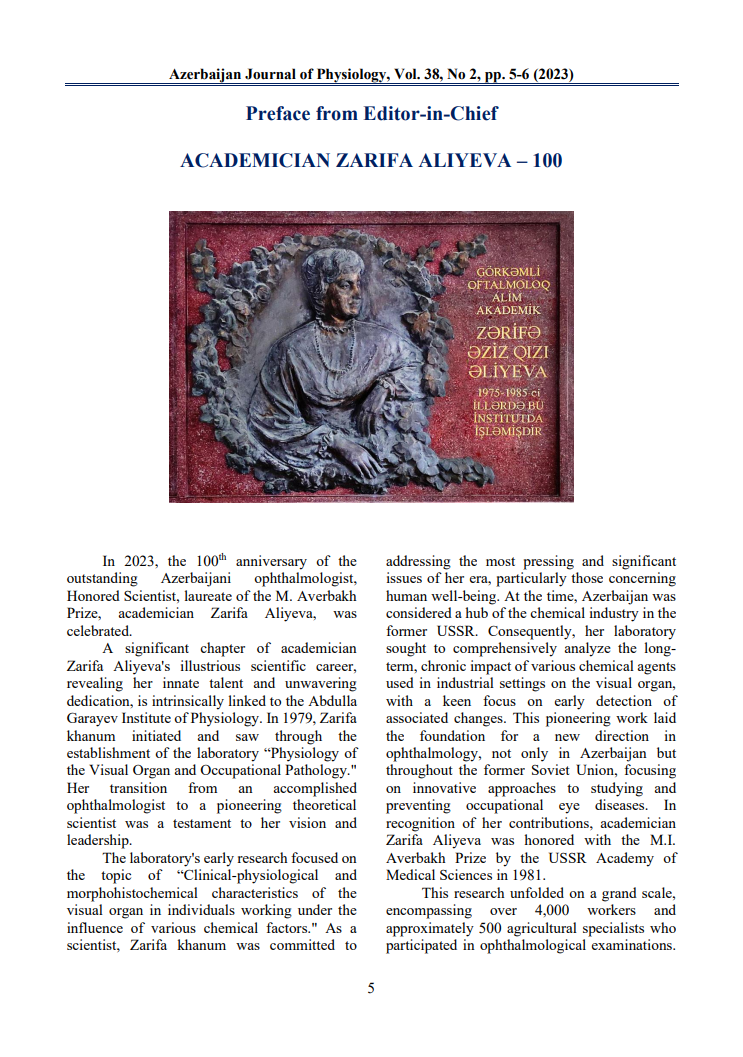Abstract
In 2023, the 100th anniversary of the outstanding Azerbaijani ophthalmologist, Honored Scientist, laureate of the M. Averbakh Prize, academician Zarifa Aliyeva, was celebrated.
A significant chapter of academician Zarifa Aliyeva's illustrious scientific career, revealing her innate talent and unwavering dedication, is intrinsically linked to the Abdulla Garayev Institute of Physiology. In 1979, Zarifa khanum initiated and saw through the establishment of the laboratory “Physiology of the Visual Organ and Occupational Pathology." Her transition from an accomplished ophthalmologist to a pioneering theoretical scientist was a testament to her vision and leadership.
The laboratory's early research focused on the topic of “Clinical-physiological and morphohistochemical characteristics of the visual organ in individuals working under the influence of various chemical factors." As a scientist, Zarifa khanum was committed to addressing the most pressing and significant issues of her era, particularly those concerning human well-being. At the time, Azerbaijan was considered a hub of the chemical industry in the former USSR. Consequently, her laboratory sought to comprehensively analyze the long-term, chronic impact of various chemical agents used in industrial settings on the visual organ, with a keen focus on early detection of associated changes. This pioneering work laid the foundation for a new direction in ophthalmology, not only in Azerbaijan but throughout the former Soviet Union, focusing on innovative approaches to studying and preventing occupational eye diseases. In recognition of her contributions, academician Zarifa Aliyeva was honored with the M.I. Averbakh Prize by the USSR Academy of Medical Sciences in 1981.
This research unfolded on a grand scale, encompassing over 4,000 workers and approximately 500 agricultural specialists who participated in ophthalmological examinations. This exemplified the close alignment of science and production, a cornerstone of modern scientific inquiry, in the work conducted by Zarifa khanum five decades ago.
Zarifa Khanum was an innovative scientist ahead of her time who introduced electrophysiological methods alongside extensive ophthalmological examinations in her research. Her studies delved into the effects of toxic substances on the functional state of the retina, free radical processes, and neurotransmitter levels. The results of her pioneering work continue to captivate and inspire numerous scholars in modern times.
A special area of Zarifa khanum's scientific inquiry was the study of age-related changes in the visual organ. Her book, “Age-Related Changes of the Eye and Optic Nerve Tract," marked the genesis of a new field within ophthalmology, known as ophthalmological gerontology. This work remains highly pertinent today, especially in the context of ongoing gerontological research at our institute. It's worth noting that her laboratory's staff continued research in this vein after her passing. In the late 1980s, the laboratory's ophthalmologists actively participated in international scientific expeditions both in Azerbaijan and in regions of the former USSR, including Crimea, as part of the “Longevity Phenomenon” international cooperation program. They studied age-related changes in the visual organ among 900 individuals over 90 years of age, publishing several highly significant scientific articles that remain relevant to specialists today.
In the 1990s, due to the challenging socio-political factors, Zarifa khanum's laboratory faced an unfortunate hiatus. In 2016, we took the initiative to reestablish this laboratory. A research group called “Physiology of Vision” was formed under the directorate to continue Zarifa khanum's legacy in the realm of physiology and age-related visual pathology. This group achieved remarkable scientific success in a short time, exploring intricate links between neurodegenerative diseases and the visual system's structures. With support from the Science Development Fund, the group launched international cooperation programs, enhancing its team and, ultimately, establishing the “Physiology of Vision and Neurodegenerative Processes” laboratory in 2021. Today, the laboratory is intently focused on studying the neurophysiological mechanisms of visual impairment during neurodegenerative diseases and pioneering innovative rehabilitation methods.
The scientific ideas of academician Zarifa Aliyeva grow in relevance with time. Her scientific legacy perseveres, serving the cause of a healthier society. It is incumbent upon all of us to support this legacy and carry forward the scientific traditions of this eminent scientist.
The International Conference "Physiology of vision and occupational pathologies: fundamental and applied aspects" and the 6th Congress of Azerbaijan Physiologists held on October 30-31, 2023, in Baku were dedicated to the 100th anniversaries of the National Leader of the Azerbaijani people, Heydar Aliyev, and the outstanding scientist, academician Zarifa Aliyeva.
The current issue of the journal is dedicated to the 100th anniversary of the academician Zarifa Aliyeva.

This work is licensed under a Creative Commons Attribution 4.0 International License.
Copyright (c) 2023 Azerbaijan Journal of Physiology





